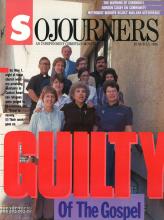The city was still blanketed in early-morning drowsiness. The sun, an orange glint on the eastern horizon, shone through broad-leafed trees. A stooped man in a gray uniform swept discarded candy wrappers and crushed soda cans into a container.
I imagined it was like the start of every other day on Capitol Hill, though I wasn't sure. I had never been there before at dawn.
Some of our small group had spent all night on the east steps of the Capitol. Others arrived at various hours throughout the night to take part in a round-the-clock vigil during the days preceding the second contra aid vote in the House of Representatives.
There was less attention than usual paid to a group of Christians praying for the people of Nicaragua and lifting up the names of the victims of the contra war. As the president had hoped, America's attention was focused elsewhere. It was April 15—the day after the U.S. air strike on Libya.
We were told that the attack was intended to put an end to terrorism. But even the president himself seemed not to believe his words. During the night huge dump trucks were parked across the entrance roads to the Capitol. The orange and white trucks dotted our view and stood as a last line of defense against potential retaliatory suicide-bombing missions on the Capitol by angry Libyans. As the usual flood of tour buses began to enter the Capitol plaza, German shepherds were guided out of police wagons bearing the K-9 insignia and set loose to sniff at luggage compartments for bombs.
Read the Full Article
